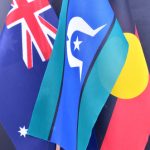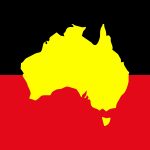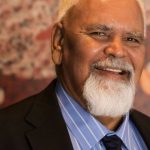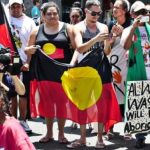Treaty First: An Interview with Uluru Summit Delegate Fred Hooper
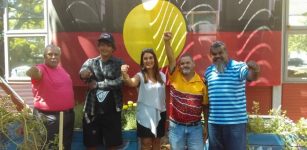
The Uluru Statement from the Heart was the culmination of a six month process that saw the Referendum Council traveling the country carrying out a series of dialogues with First Nations representatives to ascertain how Indigenous people should be recognised in the Australian constitution.
The statement was produced on March 28, the final day of the Uluru summit. The document outlines that summit delegates rejected the proposition of constitutional recognition – a statement of recognition in the constitution’s preamble or body.
Instead, a form of constitutional reform was proposed in the Uluru statement. The delegates called for a constitutionally enshrined Indigenous representative body to be established, as well as a Makarrata commission that would oversee a process of establishing Indigenous treaties.
On the Monday following the summit, Cape York leader Noel Pearson pointed out on the ABC’s Q&A that the Referendum Council proposes that the Indigenous representative body should be established through a process of constitutional change, prior to any treaties being initiated.
In favour of treaty
However, not all delegates at the summit were in agreement with the suggested final road map. On the second day of proceedings, at least seven delegates walked out of the summit. They stated that every time they tried to raise concerns about the process, they were being shut down.
The delegates that left the summit included Sydney-based Wiradjuri elder Jenny Munro, Euahlayi Gomeroi man Michael Anderson – a co-founder of the Aboriginal Tent Embassy in Canberra – and Victorian delegate Lidia Thorpe.
“We as sovereign First Nations people reject constitutional recognition. We do not recognise the occupying power or their sovereignty,” Ms Thorpe told NITV News.
The Gunai and Gunditjmara woman further explained that the group was demanding “a sovereign treaty, with an independent sovereign commission.” And the treaty process should also be governed by the Vienna Convention on the Law of Treaties.
Always independent
The Murrawarri Republic is an Indigenous nation that made a formal declaration of independence on March 30 2013. The Murrawarri people made clear that they’ve been living on their land for tens of thousands of years, and sovereignty has never been ceded.
Fred Hooper is the chair of the republic that’s situated on the border of NSW and Queensland. Mr Hooper attended the Uluru summit as a delegate from Dubbo. And he was one of the delegates that walked out of the proceedings.
Last month, Mr Hooper was involved in establishing the Union of Sovereign First Nations Northern Murray-Darling Basin Treaty. The treaty is between 16 Aboriginal nations from across the Murray-Darling Basin and brings them together to have a united voice on First Nations issues.
Sydney Criminal Lawyers® spoke with Fred Hooper about the rejection of both constitutional recognition and reform, the focus on establishing formal treaties between First Nations and the government, as well as the recent move to establish these formal ties between Indigenous nations.
Firstly, Fred, you were one of about seven delegates who walked out of the Uluru summit on the second day of the meeting. What led you all to walk out?
It wasn’t dissent against the Referendum Council and the summit.
It was an objection to somebody that got up and made a statement that they didn’t need the delegates that were raising concerns about the process, because they had the numbers and they were going to proceed with it anyhow. That person was from the Northern Land Council.
You left before the final drafting of the Uluru Statement from the Heart.
Yeah. But I went back in when they were reading it out.
I left for a couple of reasons. There were other Murrawarri delegates at the conference and they walked out, so I had to actually follow them. I couldn’t stay in the room while my fellow delegates were leaving the room.
Those two delegates actually went back into the room afterwards, and stayed in the room for the entire period. I went back in, when I knew everything was settled.
What do you think about the final draft of the statement?
I can speak on behalf of the Murrawarri Nation.
After listening to all of the opinions, we agree in principle with it. Mainly, because the statement says that we have never ceded sovereignty, and it gives a good description of sovereignty. There are calls for several treaties, as well.
But we’re not too enthusiastic about the process that they’re going to take in terms of the road map to achieve those treaties and to get to a final point.
So it’s not in our best interest to support the statement, because it calls for inclusion in the constitution, before any settlement has been reached between the First Nations. It also calls for the body, without negotiating what the body is.
The Australian people, if they’re going to vote on constitutional reform, they need to know what it’s going to be. And the other thing that it states is that the First Nations never ceded their sovereignty, but it allows the Crown to try and do that by stealth.
If First Nations people are recognised in the constitution, then we feel that First Nations people are the only people that would be given citizenship through the constitution. Because we’re not citizens of this country at the moment.
If you look at the different acts that made people citizens of the Commonwealth of Australia, First Nations people were excluded from those. And they couldn’t actually become citizens because with the constitution, at the time, they couldn’t make laws for Aboriginal people.
They’re good enough reasons for us to only support it in principle. If they can come back with a better road map that would include a process of negotiation and treaty first, and then recognition in the constitution, we’d look at it a bit better.
On the Q&A program following the Uluru summit, members of the Referendum Council said that they want to establish an Indigenous representative body enshrined in the constitution. That idea is a lot different from the constitutional recognition originally proposed.
What do you think about the proposal for such a body?
I think the body is a relevant body, only after the fact that we develop a process of agreement-making within the First Nations.
There needs to be a formal agreement between the Commonwealth, the states and the First Nations in terms of that body. Who’s it going to be made up of? What role is it going to have?
They’ve called for a Makarrata commission to oversee treaty making. But that allows the government to wriggle its way out of processes, and wriggle its way out of treaty making.
I know that Noel Pearson said that it would give legislative advice to the government. But advice is only advice.
When it comes to First Nations people we need more of a concrete process in place that is going to allow us to make decisions about our land. Because the High Court said that the Crown didn’t gain absolute beneficial ownership to the land.
There’s two types of territorial sovereignty processes within the Commonwealth and the state governments. The state government is responsible for land and water matters. The Commonwealth is basically responsible for administrative purposes.
The Commonwealth administers money. So will that body be set up to administer money to organisations or to Aboriginal First Nations?
The devil is in the detail with the organisation. People are throwing around the old ATSIC model, and I disagree with that model, because if we’re looking at First Nations, we need to deal with them as community.
I think that a lot of things that happen within community is there’s a lot of decisions made about country and First Nations that are not First Nations people’s decisions.
They’re people that live on country, but don’t have connected associations with that country through bloodline or other processes.
The Referendum Council is calling for the Indigenous body to be set up prior to establishing treaties.
The group of delegates that walked out of the summit, what were you actually calling for?
We were calling for a sovereign treaty first. We were saying that the process is in favour of the government. It’s not on a level playing field.
Once recognition in the constitution is achieved, then we believe that First Nations through that process could be ceding our sovereignty. Nations that walked out weren’t prepared for that to happen, and weren’t prepared for something to happen through stealth.
Unless there’s a formal agreement between the First Nations and the Australian government, then we’re not supporting a process of constitutional reform first.
We want to achieve a process of constitutional reform through an agreement-making process.
We want that agreement-making process to be supervised, whether it’s by the United Nations Decolonisation Committee, or whether it’s supervised by an external power, or an agreed mediator.
Not just a Makaratta position that’s set up by the government, where the rules can be established by the government in terms of the treaty making process.
We agree first to a process of treaty.
So you’re rejecting the idea of constitutional reform and recognition initially. And you want to see the establishment of treaties between the continent’s First Nations and the government first.
What would that process of establishing these treaties achieve?
It would achieve a final outcome to this process.
Our First Nations are saying we’ve never ceded our sovereignty to the Crown. We’re saying that we still own the soil. We’re sovereign to the soil. We still own it.
By achieving a treaty first, there would be a solid agreement with the Crown – through her ministers and through her governor-general – that we can take forward.
At the moment, there’s no solid agreement that we can take forward. And this constitutional recognition and constitutional reform does not allow that process to happen. It allows for the government to manipulate processes to achieve an outcome that they would like.
Once something is enshrined in the constitution, it’s very difficult to change. And like I said, what processes will happen after that? What will be the outcome?
Because if you look at the NSW government recognition of Aboriginal people in their constitution, what’s come out of it? It’s a process that happened after the 1983 Land Rights Act. It’s a process of recognising.
But by being in that constitution, they then say, “We indemnify ourselves from any litigation over whether the land was stolen. And a lot of things happened, because of the government policy of the day.”
They’re playing judge and jury, and I’m afraid that might happen with the Commonwealth if we allow that to become enshrined. There might be a clause in there that doesn’t look at reparations or anything like that.
Last month, you were involved in organising the signing of a treaty between 16 Aboriginal nations from across the Northern Murray-Darling Basin.
What is it hoped this treaty between Indigenous nations will achieve?
It’s a treaty of unity. It’s a treaty for us to come together and say, “We’re First Nations people. We agree collectively that we have not ceded our sovereignty. We agree collectively that these are the processes we’re going to look at into the future.”
The alliance is looking at forming a form of government similar to the European Union.
The aspirations of that treaty are that we can look at development. We can look at First Nation government processes and at capacity building within those First Nations.
We can look at building those First Nations into something that has a government structure and makes decisions about their nation and their country.
And is there talk of other treaties like this being established between First Nations around the continent?
I was allowed to take the treaty to the convention at Uluru, which we spread around. There are other people out there that have taken it on board, are looking at it and deciding how they could do that in their own areas.
With the Northern Murray-Darling Basin Treaty, we come together. We’ve got a similar geographical area, similar issues and similar processes.
What that treaty has done is it’s brought those nations together. And that’s what other nations can do – look at how a coastal group of nations would work together in terms of trade, education and language processes.
And lastly, Fred, after the Uluru summit was over there seemed to be a sense that change was possible. There were only 250 delegates at the summit. What do you think the majority of Indigenous people around the continent are calling for at this point in time?
It was evident from the feedback from the dialogues around the country that people wanted a treaty. They wanted to say that their sovereignty has never been ceded and they’re looking for a treaty.
We’ve travelled this country far and wide and lots of people are telling me that they would like a treaty and to finalise it with the Crown of Great Britain. Because, when you look at it, the ministers that are supposed to represent the people, represent the Crown of Great Britain.
So people want a treaty. They want to be able to finalise this once and for all.
And in saying that, also, what a treaty can do is that it can allow for the establishment of a truth commission as well.
A lot of people are saying, “We want a truth commission established. We want to be able to tell the truth. And we want the rest of the nation to know the truth about what’s happened in this country over the last 200 years.”
Fred thanks very much for taking the time out to speak with us. And continued success with your work to establish Indigenous treaties around the country.
No worries.


